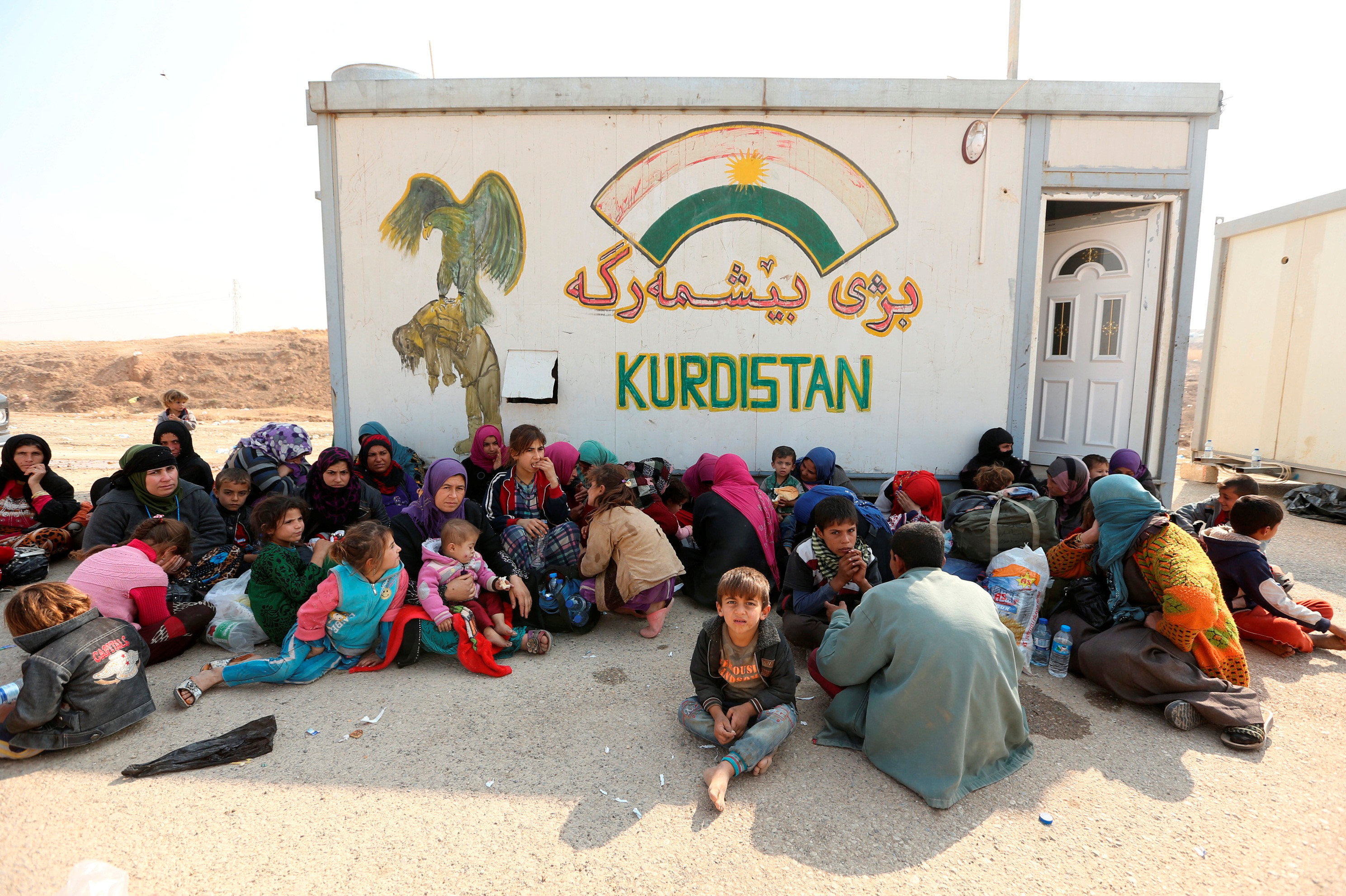Image: Displaced people who are fleeing from clashes in Nawaran north of Mosul during an operation to attack Islamic State militants, Iraq October 26, 2016.
By Babak Dehghanpisheh
SOUTH OF MOSUL, Iraq (Reuters) – The Iraqi policeman wept beside his convoy, stopped in a village near the front line.
For two years he had prayed he would again see the family he had left behind when his village near Mosul was overrun by Islamic State while he was off on deployment. Now, as a member of the national police force, he was personally participating in the assault to repel the fighters from the area.
Last week he learned from other advancing Iraqi forces who reached his home village that they had arrived too late to protect his family. Fleeing militants had taken them hostage and were bringing them deeper towards Mosul to use as human shields.
“I can’t describe the feeling,” said the policeman with a neatly trimmed moustache, his voice breaking. He asked that his name and village not be identified to protect the family members still in the hands of the fighters.
“I’m afraid they will keep pulling them back from village to village until they get to Mosul. And then they will disappear.”
As Iraqi forces have pressed forward in the assault of Islamic State’s last major stronghold in the country, they have encountered mounting evidence that the fighters are taking civilians to use as human shields.
“Daesh tried to take us as human shields but we escaped,” said Mahmoud Ali Khalaf, 41, in Nana, a village the fighters had abandoned as they fled towards front lines now located a 20 minute drive away. “They were taking us to Mosul as protection for them.”
Khalaf’s brother was shot and killed by Islamic State when he tried to escape last Friday, Khalaf said.
The battle for Mosul, mounted by 50,000 government troops, Kurdish fighters, police and volunteers, is expected to be the biggest ground assault in Iraq since the 2003 U.S.-led invasion.
The United Nations says as many as 1 million people could be suddenly uprooted, requiring the world’s largest humanitarian relief operation.
The U.N. human rights office said on Tuesday it had preliminary reports about scores of killings by Islamic State around Mosul in the past week, as well as new information reinforcing the belief that fighters were holding people as human shields.
STRONGER THAN WHAT WE SEE
It is a tactic Islamic State fighters have used repeatedly in other smaller battles, and which could take place on an unprecedented scale in Mosul, a city many times larger than any other the militants have held.
Outside the village of Saf al-Tuth, Major General Najm al Jabouri directed heavy machinegun fire at a sparse concrete building on a ridge where his men believed a sniper was hunkered down. Volleys of rockets flew over the ridge with a whoosh and pounded the village itself with loud booms.
The fight so far has not been as difficult as anticipated, according to Jabouri, commander of Mosul operations for the Iraqi army. But he believes worse is still to come, as government forces bear down on Mosul itself.
“We expect they are stronger than what we see,” Jabouri said on Tuesday evening.
Since the operation began on October 17th, Jabouri’s forces have managed to retake around 35 kilometres of territory back from Islamic State. But although the enemy has not halted the advance, fighters have shown that they can still pose a deadly threat: Jabouri’s soldiers have destroyed at least 95 car bombs.
One of the worst fears of the United Nations is that retreating fighters could attempt to use crude chemical weapons.
Khalaf, the man who escaped Islamic State, lives directly next to a sulphur plant which Islamic State fighters set ablaze before they retreated. His children have all developed respiratory problems from the toxic smoke. One of his sons wore a surgical mask on Wednesday for protection from the fumes.
Islamic State fighters kept up their fierce defence of the southern approaches to Mosul on Wednesday, holding up Iraqi troops there and forcing an elite army unit east of the city to put its more rapid advance on hold.
Jabouri, the commander, was not overly concerned about the fighting ahead but fretted about the plight of civilians caught up in the battle.
“The big challenge is protecting the civilians,” Jabouri said. “This makes our mission very hard.”
Copyright 2016 Thomson Reuters. Click for Restrictions.


